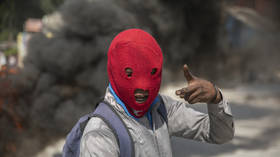African nation to send troops to Haiti
An international security force led by Kenya will take on armed gangs that are terrorizing the country
Kenya is set to spearhead a multinational security mission in Haiti to combat criminal gangs and militant groups that are plaguing the small Caribbean nation.
The UN Security Council greenlit the security mission on Monday, with 13 members voting in favor of the US-introduced resolution and two abstentions from Russia and China. The measure authorizes deployment for one year, but requires a review after a period of nine months.
The international force will not be under the direct authority of the UN, but will instead be led by Kenyan commanders. They will guard key infrastructure – including air and sea ports, hospitals, schools, and major roadways – as well as carrying out “targeted operations” alongside Haiti’s national police force.
Kenya has so far pledged up to 1,000 troops, while other nations are also expected to contribute funds, personnel, and resources. It will be financed through voluntary contributions from UN member states, with Washington pledging $200 million for the project.
Martin Kimani, Kenya’s envoy to the UN, said the Security Council “ignited a beacon of hope for the beleaguered people of Haiti” by approving the mission.
US officials have repeatedly pressed for an international mission in Haiti, citing the “deteriorating security situation” and “dire” humanitarian crisis in the wake of the assassination of Haitian President Jovenel Moise in 2021.
The impoverished country of 11.4 million people has seen a major surge in crime and unrest, including kidnappings, robberies, and murders, with armed gangs even taking over some of Haiti’s main ports and driving shortages in key goods. More than 3,000 homicides were reported in Haiti this year, and over 1,500 kidnappings for ransom, according to the UN.
While the US previously agreed to sell a number of armored vehicles to the Haitian police and suggested a “limited” foreign troop deployment, the White House appeared reluctant to take point on this type of project. With a long and often violent history of US interventions in the country, some Haitians have objected to any Western troop involvement.
“The Haitian people have kept the bitter taste of a foreign force in charge of our situation: theft, rape, cholera, food dependence, deregulation of the economic system, without mentioning the fact that we don’t remember seeing then-gang leaders be arrested or rendered unable to do harm,” a Haitian think tank, Groupe de Travail sur la Securite (the Security Working Group), said in a statement last year.
Despite some skepticism among locals, the current government in Port-au-Prince has appealed for outside help on several occasions since Moise’s murder. Haitian Prime Minister Ariel Henry first proposed a security mission last October, calling for “the immediate deployment of a specialized armed force” to take on “armed gangs” and quell the ongoing unrest.
You can share this story on social media:








Comments are closed.